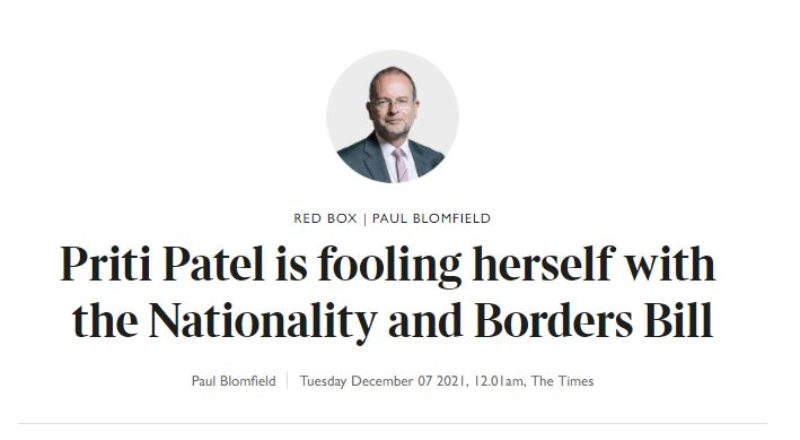Paul Blomfield Former MP for Sheffield Central

I wrote this article for The Times, setting out the deceit of the Nationality and Borders Bill. You can read the full text below:
In the shadow of the recent tragedy in the Channel, the Nationality and Borders Bill returns to the Commons this week, prompting the question of whether it will achieve its stated objectives of deterring deadly journeys, increasing fairness in the asylum system and making removals easier. More importantly, we should ask if Ministers even intend it to work.
The layers of deceit on which the Bill is built started with the promise to ‘take back control’ of our borders which, following the graphic images from Calais in the summer of 2015, played a big part in the referendum result – which left us with fewer levers of control.
Then and now, Ministers have created a narrative of refugees entering the EU with the single objective of gaining entry to the UK, taking a long journey across the continent and ignoring all countries on their route. It’s a story backed by repeated claims of the UK’s leading role in taking refugees, particularly in contrast with our European neighbours.
All of this turns the truth on its head. Only 3% of those entering the EU arrive on the French coast seeking entry to the UK, with 16 countries taking more refugees per head of population, and the greatest contribution being made by those front-line countries outside Europe.
Sympathy for those seeking refuge in the UK is deliberately undermined by the suggestion that they are not genuine asylum seekers but ‘economic migrants’, although consideration of the main countries – Iran, Iraq, Syria, Afghanistan – from which they come explains why two-thirds will secure asylum if they make it to our shores.
The harsh measures of the Bill are justified, or so we are told, because the objective is to tackle the cruel people-smuggling gangs. The real situation is more complex and while the Bill claims to target smugglers, it criminalises those taking desperate journeys while smuggling gangs will continue to profit from riskier trips. Indeed, only one clause in the 111-page Bill even targets the smugglers.
The biggest deceit though is that the Bill will reduce the numbers crossing the channel. The Bill’s own impact assessment admits there is no evidence its measures will work and a risk that deterrence measures could push asylum seekers into making more dangerous journeys.
It will create two categories of refugees; those who take the legal routes which Ministers are closing down and the overwhelming majority who will lose the traditional rights of those seeking asylum. Condemned as contravening the Refugee Convention by the UNHCR – the UN’s Refugee Agency – it provides Priti Patel with an opportunity to talk tough but offers no workable answers.
The headline grabbing proposal to ‘offshore’ processing of refugees and the threat, which Boris Johnson has tried to make the defining issue of this week’s votes, to ‘push back’ at sea will have no impact. There is not a country willing to host UK processing centres, a strategy for returning those whose applications fail, nor a responsible Border Force captain who will give the order to risk the lives of desperate occupants of rubber dinghies.
Ministers must know that their proposals won’t work. They have tried and failed to negotiate the agreements on which they depend. They may think the tough rhetoric will gain them time until the next election.
But they should take care. Dehumanising refugees as a basis for action which defies international law creates opportunities for darker forces when the Bill fails to deliver on the false expectations that have been built.
Instead, we should all recognise that this is a complex problem with no easy solutions, which will only become more challenging as we face the prospect of climate refugees. Open borders are neither desirable nor practical, but countries like ours could do much more, with refugees making up just o.19% of our population, compared to 0.45% in France, and 1.5% in Germany.
At the heart of any answer should be safe routes, providing refugees with the alternative to people smugglers, currently absent from the Bill. The USA has recently pledged to resettle 125,000 refugees next year. We and others must make our own commitments on resettlement targets.
Above all we need to be honest in the way we discuss the issue, to develop a public discourse which recognises that those taking desperate journeys are doing what people have done since the beginning of time – moving when life becomes unbearable and unsafe in their homeland.
Paul Blomfield MP is a former Chair of the All-Party Parliamentary Group on Migration and served on the Public Bill Committee for the Nationality and Borders Bill.
